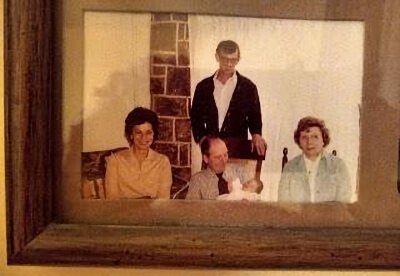Hidden Grief Part 2: Grandparents
Author: Kathleen M. Cleaver
Published: 2021/04/23 - Updated: 2022/03/11
Category Topic: Blogs - Stories - Related Publications
Page Content: Synopsis - Introduction - Main
Synopsis: This is the second part of Hidden Grief by Kathleen M. Cleaver, the parent of Tricia who has multiple disabilities caused by hypoxia during the birth process. Grandparents experience a "double grief" when their grandchild has a disability. Not only are they grieving the grandchild's disability, they are grieving for their own child and their lost dreams. This grief is often not recognized or supported.
Introduction
NOTE: This is the second part of Hidden Grief by Kathleen M. Cleaver, you may wish to read Part 1 first.
Main Content
This post is dedicated to all grandparents. Thank you for your wisdom, love, and support.
Grandparents experience a "double grief" when their grandchild has a disability. Not only are they grieving the grandchild's disability, they are grieving for their own child and their lost dreams. This grief is often not recognized or supported. The article, In Grandparenting A Child with Special Needs, Dr. Charlotte Thompson describes grandparent grief in the following way:
"Shock, numbness, denial, bargaining, hysteria, anger, guilt, are all normal reactions, but the most immediate are shock and numbness. Both are nature's way of allowing to regroup after a heart-wrenching occurrence to develop some coping mechanisms."
Many factors affect how grandparents react to the news that their grandchild has a disability Ms. Sandra Woodbridge from the School of Human Sciences in Meadowbrook Australia published a study about grandparent grief as did Sherman, Gadner, Brown, and Shutter. Grandparents' reactions depend on their previous experiences with someone who is disabled. Social attitudes and family relationships also play a part.

My parents experienced more than "double grief" when our daughter,Tricia, was born critically ill with a severe seizure disorder. They were not shocked upon seeing a tiny infant in the NICU. For them, it was deja vu. My sister, Barbara was delivered by cesarean section after failure to deliver naturally. Barbara suffered a cerebral bleed shortly after she was born. She was diagnosed with bilateral cataracts rendering her legally blind. As my sister grew and developed so did the disabilities. Around the age of three, Barbara was diagnosed as having a significant intellectual disability. At the age of five, when being evaluated by a school principal at a school for the blind, it was found that Barbara had a moderate hearing loss. Barbara had six major eye surgeries and two hospitalizations for serious seizures before she turned four years old. My parents knew what might be ahead for Tricia and my family. They knew that there would be friends and family to accept Barbara and provide support and there would be others, either out of fear or ignorance, who would turn away. They did not share their grief with my husband and me. They enveloped us with love and support.

My in-laws were in a state of shock when seeing Tricia for the first time in the NICU. This had never happened in their family. It was uncharted waters for them. I am told that my father-in-law became physically ill when he returned home. My mother-in law distanced herself and looked for answers within my family for Tricia's disability. They did not share their grief with my husband and me. Like my parents, they enveloped us with love and support.
The grief grandparents experience when their grandchild has a disability is rarely recognized. When researching for this blog, I found numerous articles advising grandparents of ways to be supportive of the family when their grandchild has a disability. There is minimal information about the grief they encounter. Just as grief is acknowledged when a loved one dies, the same holds true for grandparents and their lost dream of a perfect grandchild. The initial reactions of shock, denial, anger, and rejection need to be recognized as normal ways of coping with their grief. Parents and grandparents together need time, support, and understanding in order to create new dreams.
In Grandparenting a Child with Special Needs, Dr. Charlotte Thompson wrote: "Every child is a special wonderful human being. If you can see the baby or child and not the disability, you will be offering the child and the parents a great gift."
Let us guide and support one another to see "every child as a wonderful human being."
 Author Credentials: Kathleen M. Cleaver holds a Bachelor’s degree in elementary education and the education of children whose primary disability is a visual impairment (TVI). During her thirty-year career as a teacher, Kathleen received the Penn-Del AER Elinor Long Award and the AER Membership Award for her service and contributions to the education of children with visual impairments. She also received the Elizabeth Nolan O’Donnell Achievement Award for years of dedicated service to St. Lucy Day School for Children with Visual Impairments. Explore Kathleen's complete biography for comprehensive insights into her background, expertise, and accomplishments.
Author Credentials: Kathleen M. Cleaver holds a Bachelor’s degree in elementary education and the education of children whose primary disability is a visual impairment (TVI). During her thirty-year career as a teacher, Kathleen received the Penn-Del AER Elinor Long Award and the AER Membership Award for her service and contributions to the education of children with visual impairments. She also received the Elizabeth Nolan O’Donnell Achievement Award for years of dedicated service to St. Lucy Day School for Children with Visual Impairments. Explore Kathleen's complete biography for comprehensive insights into her background, expertise, and accomplishments.